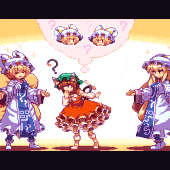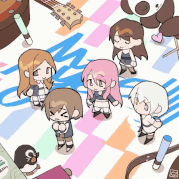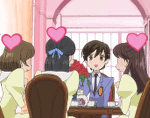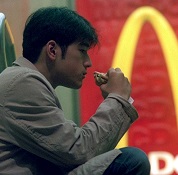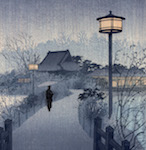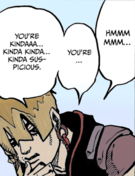|
You know Ikuhara and Morishima basically had this conversation in one of their interviews like 2 months ago. Ikuhara likens the sort of conflict less love stories as fluff and he doesn't like writing them, Morishima mentions that she likes doing "fluff" and that there's nothing bad about it.
|
|
|
|

|
| # ? Apr 30, 2024 11:35 |
|
My thoughts on the last episode and the series in general. 'meh' Thanks.
|
|
|
|
Cao Ni Ma posted:You know Ikuhara and Morishima basically had this conversation in one of their interviews like 2 months ago. Ikuhara likens the sort of conflict less love stories as fluff and he doesn't like writing them, Morishima mentions that she likes doing "fluff" and that there's nothing bad about it.
|
|
|
|
Basically people should write things they enjoy writing. edit: And criticizing Morishima's works for not being heavy on social criticism is a bit silly in my mind, since most of her work appears to have been published in magazines for lesbians. The target demographic is already well aware of that stuff. Motto fucked around with this message at 02:14 on Mar 31, 2015 |
|
|
|
Paraphrasing from a post I saw on a random IRC channel:quote:If you think about it.... This is basically the plot of Shrek. Oh Snapalope fucked around with this message at 02:17 on Mar 31, 2015 |
|
|
|
Isn't Morishima an out lesbian? The idea that she portrays lesbian relationships as lesser to heterosexual ones is kinda hilarious.
|
|
|
|
Oh Snapalope posted:Paraphrasing from a post I saw on a random IRC channel: haha holy poo poo it's true
|
|
|
|
Oh Snapalope posted:Paraphrasing from a post I saw on a random IRC channel:
|
|
|
|
Oh Snapalope posted:Paraphrasing from a post I saw on a random IRC channel: This is objective proof that this show I haven't watched is good.
|
|
|
|
Oh Snapalope posted:Paraphrasing from a post I saw on a random IRC channel: this is beautiful
|
|
|
|
Personally I think the show kinda crossed a line between homage and outright theft with how much visual design it took from Suspiria, but that's a heavier conversation than I'm willing to get into probably.
|
|
|
|
also ikuhara will never get over that coffin thing, will he
|
|
|
|
Speaking of Morishima, I'm super bummed that there's still only three chapters translated of her manga take on this. edit: It's especially a pain since if only the first two chapters were translated it'd be cute, but the end of chapter three is where drama is beginning to happen.
|
|
|
|
I can see why a lot of people are reading the ending as representing Ginko and Kureha's death, but especially in the context of all of Ikuhara's previous work I think it can reasonably be taken at face value: if being with the person you love requires you to walk away from your whole world, it's possible to do that, find people willing to follow you and maybe even change the world you left behind in the process. If we were supposed to think Ginko and Kureha had died, that one girl walking out on the speech at the end and following in Kureha's footsteps by caring for an abandoned bear wouldn't be presented in such a positive light. The whole show symbolically connects social exclusion with death, but I think it's possible to read the ending as making the point that that the two aren't equivalent, even if it looks that way from the perspective of those inside the system. Hell, considering the appearances of Sumika, Lulu and Milne in the ending, I think it's possible to see all the death in the series as symbolic rather than literal: the excluded girls are ultimately the ones who escape, while the invisible girls make their own world smaller and lonelier (look how empty the classroom is in the last couple of episodes!) I think that's still an important and relevant message for plenty of queer people today. I guess if I have a complaint about the ending it's that thematically it's kind of a retread of the Utena movie's ending, although I do feel like YKA does a little more with its setting rather than just using it as a backdrop for the protagonists.
|
|
|
|
http://i.imgur.com/QPAAeoW.jpg Well this show was pretty silly. Shabadadu.
|
|
|
|
No, you are absolutely right thats how the ending is supposed to be taken in the context of everything else in the story, you just have to listen to what the characters are saying when they jump into the storm to realize it. But people have been getting caught up with how things look in the show since it started so its not surprising that some would interpret it this way.
|
|
|
|
Thuryl posted:I can see why a lot of people are reading the ending as representing Ginko and Kureha's death, but especially in the context of all of Ikuhara's previous work I think it can reasonably be taken at face value: if being with the person you love requires you to walk away from your whole world, it's possible to do that, find people willing to follow you and maybe even change the world you left behind in the process. If we were supposed to think Ginko and Kureha had died, that one girl walking out on the speech at the end and following in Kureha's footsteps by caring for an abandoned bear wouldn't be presented in such a positive light. The whole show symbolically connects social exclusion with death, but I think it's possible to read the ending as making the point that that the two aren't equivalent, even if it looks that way from the perspective of those inside the system. Hell, considering the appearances of Sumika, Lulu and Milne in the ending, I think it's possible to see all the death in the series as symbolic rather than literal: the excluded girls are ultimately the ones who escape, while the invisible girls make their own world smaller and lonelier (look how empty the classroom is in the last couple of episodes!) I think that's still an important and relevant message for plenty of queer people today. I think I'd be more comfortable with this interpretation if it wasn't for the particular cultural issue this show addresses, the place of lesbians in Japan. The idea that if your life doesn't work out or society doesn't accept you then you can escape to another world is a cornerstone of the enormous Japanese suicide rate, and the social stigma gay men and women (especially women) face makes them especially vulnerable to it, to the point where lesbian double-suicide is a cliche. The majority of the LGBT rights movement in Japan has been about showing that there is a place for gay people in this world as well, so while 'at least their martyrdom inspired others not to back down on love and keep looking for a better way' may be a clever little homage to the role a genre that Ikuhara has enormous affection for played in the early stages of the modern Japanese LGBT movement, it's still kind of retrograde for such an overtly political work in 2015.
|
|
|
|
I get where you're coming from and I do think some of the metaphors got away from themselves at times to the show's detriment, but I don't think "martyrdom" is the right way to describe that ending. I didn't see it as saying "it's okay if we die because one day people will realise the world is poorer for our absence", but more like "we don't need to seek outside acceptance by fitting into other people's ideas of what we should be: even if we have to give up a lot along the way, we can build our own world for ourselves where we can love each other the way we want to, and if other people don't like it then that's their problem". The whole scene with Kureha becoming a bear doesn't make any kind of narrative sense to me if both of them are just going to die anyway; if we're just supposed to read that as Kureha choosing to share Ginko's fate as part of an "ordinary" lesbian suicide pact, it wouldn't have the worldview-shattering effect on the invisible girls that we see it having. The very fact that lesbian double suicide is a cliche in Japan is one of the things that convinces me there has to be something else going on there, because whatever we're looking at in that scene it's definitely being presented as a miracle beyond the invisible girls' comprehension. I dunno, maybe I'm reading different things into the show than you are, but as a lesbian who mostly hangs out with other queer people it resonated with me on that level, anyway. edit: given the cultural context I do understand why you'd be uncomfortable with YKA using death as a metaphor in the way it does, but I guess I'd say that I see it as acknowledging the cultural and historical background of the genre rather than condoning it. Thuryl fucked around with this message at 10:55 on Mar 31, 2015 |
|
|
|
Thuryl posted:I guess if I have a complaint about the ending it's that thematically it's kind of a retread of the Utena movie's ending, although I do feel like YKA does a little more with its setting rather than just using it as a backdrop for the protagonists. The whole thing in YKA just felt very underdeveloped. Also, I did not take the ending of YKA to mean that they are dead either. At minimum, there's a literal 2-way door connecting the bear and human worlds, so them being in the bear world is not them being truly dead. It's just not very well developed what the bear realm is supposed to be without having to reach outside the show a lot and a lot of guesswork. It seems pretty clear to me that neither realm is the sole metaphorical representative of our real world though. Kylra fucked around with this message at 11:50 on Mar 31, 2015 |
|
|
|
Kylra posted:I'm pretty sure that's basically how Utena the series ended. Utena just disappeared from the school, basically entirely forgotten by everyone except Akio and Himemiya. Akio is left behind in the small "coffin", while Himemiya goes out into the larger world. They're not in the bear world, though. They're in a place 'beyond severance' explicitly shown to be outside the forest (representing the bear world) and the moon (representing the human world). This wasn't just them escaping to an idyll on the other side of the wall, because we've seen that the bear world is pretty hosed-up as well.
|
|
|
|
Darth Walrus posted:They're not in the bear world, though. They're in a place 'beyond severance' explicitly shown to be outside the forest (representing the bear world) and the moon (representing the human world). This wasn't just them escaping to an idyll on the other side of the wall, because we've seen that the bear world is pretty hosed-up as well.
|
|
|
|
Sharkopath posted:Personally I think the show kinda crossed a line between homage and outright theft with how much visual design it took from Suspiria, but that's a heavier conversation than I'm willing to get into probably.  I really liked that shifting, changing symbol, odd that they just stole it like that. I've never seen Suspiria but it's a bit odd to imagine it a reference/homage when it was used in such a key way, weird.
|
|
|
|
There's tons of horror movie refs in YKA for some reason.
|
|
|
|
Another way to interpret the ending could be that they're not dead, they just moved to America and got married, or something along those lines. I mean, Lulu is definitely dead and she's in heaven with her little brother, but Ginko and Kureha are just... elsewhere. So according to Ikuhara, Japan is a lost loving cause and you should just move abroad before you get firing squadded. Thuryl posted:The whole scene with Kureha becoming a bear doesn't make any kind of narrative sense to me if both of them are just going to die anyway; if we're just supposed to read that as Kureha choosing to share Ginko's fate as part of an "ordinary" lesbian suicide pact, it wouldn't have the worldview-shattering effect on the invisible girls that we see it having. The very fact that lesbian double suicide is a cliche in Japan is one of the things that convinces me there has to be something else going on there, because whatever we're looking at in that scene it's definitely being presented as a miracle beyond the invisible girls' comprehension. I think that was more Kureha realizing that she didn't have any right to turn Ginko into a human without even asking her, regardless how good her intentions were. If she really loved her, she'd turn herself into a bear, and so she did.
|
|
|
|
Sakurazuka posted:There's tons of horror movie refs in YKA for some reason.
|
|
|
|
Endorph posted:utena is filled with twin peaks homages. ikuhara just likes his random references. Wait, what? I don't remember seeing any, but then again I did watch both series a long time ago.
|
|
|
|
Soks posted:
Besides just that symbol major portions of the environment design are taken wholecloth from suspiria, along with the color palette used for most of the show and even most of the cool intricate patterns people like. The Roof is the Foyer from suspiria, their little garden is from a room in one of the scenes, the entire school is just the school from suspiria, both the design of the classrooms and the hallways. Even the bird pattern is from suspiria, although the filler in the movie isn't a lily flower. It's just so blatant and ominpresent that I find it hard to count it as a homage or reference, because those environments make up almost the entire show and even drive the aesthetic design, because like I said the palette for the show is exactly the same as suspirias indoor scenes.
|
|
|
|
You should watch Suspiria, which is good though.
|
|
|
|
At least he references good stuff, I guess. Suspiria is one of those things that it feels like I really should have already seen and I don't know why I haven't.
|
|
|
|
Sakurazuka posted:At least he references good stuff, I guess. It's pretty violent but incredibly well shot and the environments and sets are beautiful, definitely a film where the visuals alone make it worthwhile.
|
|
|
|
Several thoughts, not all of them fully considered. * I enjoyed that more than I thought I would, and I'm glad I stuck with it until the end. I found the final few episodes fairly rewarding, even if there are some side issues concerning the show that I'm not fond of (the buzzing wasp; the tribunal). * The cyborg bear was, I guess, a self-hating queer woman who was co-opted into the cause? I found that material far more touching and moving than I thought I would, I was surprised. * They're not dead. Even within the body of the work, they're clearly not dead -- the door out of there opens moments just before they're shot, and that one girl later recalls them escaping under the cover of gunfire. The best way I can think of describing what happened is as some kind of ascension -- they're certainly not hanging out with the other dead characters at the end of the piece. * Which, if you think about it, is a repudiation of all that Class S dead queer girl syndrome. Queer women, who truly commit to each other, never die, but are whisked away to another, better place by the patron saint of idealised love, Kumaria. * On the other hand, yeah, it's also a repudiation of the idealised love. Their utopia is impossible to get to by normal means, and striving for it has led to an awful lot of death. It's a place defined by myths and fairy tales even beyond the world in which they live (which is pretty extreme in this case -- the entire setting is swimming in borrowed ideas and images, that are meant to stand in for other, broader ideas), and is so even less real than anything else going on here. Kureha and Lulu end up transcending the symbolic order and reaching into the imaginary, in rejection of Class S neutralisation, but the problem of abject bodies still continues to exist. * Which is, I think, what I primarily take away from this. It's okay to have escapism and we should strive to tell stories that prescribe positive outcomes for minority characters -- particularly when those are taboo. But, simultaneously, it becomes easy to think of ourselves as living in a post-homophobic world if we do that, and that's not the case. Pure escapism is just as false and pure nihilism: the good world exists, and it's something we should strive for, but we're nowhere near that yet. * But there's still hope.
|
|
|
|
http://news.yahoo.com/same-sex-marriage-wins-recognition-tokyos-shibuya-ward-065954812.html By Yuri Kageyama Oddly apropos
|
|
|
|
That's pretty cool.
|
|
|
|
So long Yurikuma, you were light on interesting imagery and even lighter on interesting characters, and basically a disappointment all around.
|
|
|
|
Paracelsus posted:So long Yurikuma, you were light on interesting imagery and even lighter on interesting characters, and basically a disappointment all around. See you next bear
|
|
|
|
Mymla posted:I think that was more Kureha realizing that she didn't have any right to turn Ginko into a human without even asking her, regardless how good her intentions were. If she really loved her, she'd turn herself into a bear, and so she did. I can see it as a closeted/out thing. Kureha wanted Ginko to be closeted so they could be together, like a lesbian couple hiding themselves as "friends". Kureha was the first closeted person in this world to say "no, screw this, if we can't be together as ourselves then what's the point?" and came out. Them getting shot at are the girls freaking out that there's an out lesbian couple right there who aren't caring what everyone says. When Kureha and Ginko ascend, it's basically them going "gently caress getting poo poo on for being ourselves, we reject the system totally". Laser girl starts rejecting the system right after, because even though the school sees "scaring" Kureha and Ginko away as a shaky victory she knows the truth. It's admittedly a bit tangled but I think that's kinda what they were aiming at.
|
|
|
|
Gyre posted:I can see it as a closeted/out thing. Kureha wanted Ginko to be closeted so they could be together, like a lesbian couple hiding themselves as "friends". Kureha was the first closeted person in this world to say "no, screw this, if we can't be together as ourselves then what's the point?" and came out. Them getting shot at are the girls freaking out that there's an out lesbian couple right there who aren't caring what everyone says. When Kureha and Ginko ascend, it's basically them going "gently caress getting poo poo on for being ourselves, we reject the system totally". Laser girl starts rejecting the system right after, because even though the school sees "scaring" Kureha and Ginko away as a shaky victory she knows the truth. That makes a lot of sense, actually, or at least that's a version that works for my brain. I think the fact that Ginko and especially Lulu were murderers makes everything pretty murky though. It's difficult to read that ending as happy given that one of the two idealised lovers is a remorseless killer.
|
|
|
|
Open Source Idiom posted:That makes a lot of sense, actually, or at least that's a version that works for my brain.
|
|
|
|
To cap things off, here are the Ekens and Creamer writeups for Episodes 11 (Ekens, Creamer) and 12 (Ekens, Creamer). I've been especially impressed with Ekens's work on this show - ANN's episode reviews can sometimes be shallow and patchy, but she's really gone above and beyond here.
|
|
|
|

|
| # ? Apr 30, 2024 11:35 |
|
Gyre posted:I can see it as a closeted/out thing. Kureha wanted Ginko to be closeted so they could be together, like a lesbian couple hiding themselves as "friends". Kureha was the first closeted person in this world to say "no, screw this, if we can't be together as ourselves then what's the point?" and came out. Them getting shot at are the girls freaking out that there's an out lesbian couple right there who aren't caring what everyone says. When Kureha and Ginko ascend, it's basically them going "gently caress getting poo poo on for being ourselves, we reject the system totally". Laser girl starts rejecting the system right after, because even though the school sees "scaring" Kureha and Ginko away as a shaky victory she knows the truth. I'm pretty sure this is it. The ending reminded me a hell of a lot like Utena's, where it seems like its a tragic ending and that Utena has has failed at being a prince but really she's just accepted herself as who she is and stopped playing these silly games of princes and self-torturing bullshit that everyone else is still stuck in. We saw Lulu and her brother in the world of the dead and Kureha and Ginko weren't there. The firing squad was just there to make things ambiguous because Ikuhara loves his loving ambiguous angst and so the Invisigirls could delude themselves that they've "won". I think the ending was a subversion of their desire to "Exclude" the pair through death, and instead Ginko and Kureha just peaced out themselves and walked away from the system. Thus being "beyond severance". That might have been redundant, but I basically think you've hit it square on the nose and helped me organise my own thoughts on it. This quote seems pretty apt as well: “Those who reject that place are, conversely, rejected by it as well. This is the nature of systems: The moment you reject them, you are forced to realize that they’re the very ground you’re standing on.” —Kunihiko Ikuhara, Utena Episode Commentary: Part 2 Nephthys fucked around with this message at 17:58 on Apr 2, 2015 |
|
|







